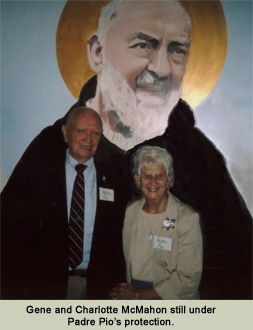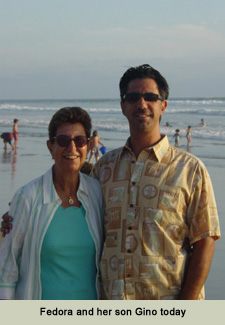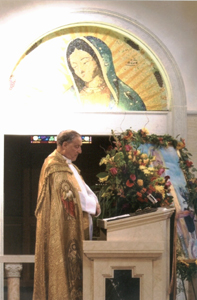“Be of good cheer; abandon yourselves to the Sacred Heart of Jesus
and let Him take care of everything.”
– St. Pio of Pietrelcina
A Soldier’s Story of Padre Pio
Some time ago, we received a letter from a woman who requested that the prayers of Padre Pio be sent to her. In her letter, she mentioned that one of her relatives had met Padre Pio many years before. When we asked for further information, she gave us the phone number of Gene McMahon. We were able to visit Gene and Charlotte McMahon in Stirling, New Jersey in 2007. We followed up the visit with a number of phone calls. This is Gene’s remarkable story:
 Eugene (Gene) McMahon, of Plainfield, New Jersey, was very happy he could finish the baseball season and his senior year of high school before receiving his draft notice to report for military duty. It was 1943 and World War II was in full swing. When Gene completed preflight training and gunnery school, he was assigned to the 463rd Bomb Group of the 15th Air Force as a tail gunner and waist gunner on B-17 planes. He was sent overseas to the U.S. air base in Foggia, Italy.
Eugene (Gene) McMahon, of Plainfield, New Jersey, was very happy he could finish the baseball season and his senior year of high school before receiving his draft notice to report for military duty. It was 1943 and World War II was in full swing. When Gene completed preflight training and gunnery school, he was assigned to the 463rd Bomb Group of the 15th Air Force as a tail gunner and waist gunner on B-17 planes. He was sent overseas to the U.S. air base in Foggia, Italy.
One day at the base, the squadron chaplain, Fr. George Rice, invited Gene and his best friend, Tony Afflitto to take a trip “up in the mountains” to visit Padre Pio. Fr. Rice explained that Padre Pio was a very holy priest who had the stigmata, the wounds of Christ. He never left his monastery but spent much time in prayer and seclusion. Gene found Fr. Rice’s words about Padre Pio intriguing. He had never heard of Padre Pio but he was very anxious to meet him.
Fr. Rice explained that it was customary to bring a gift when making a visit to the monastery and since he heard that Padre Pio enjoyed American beer that was what the soldiers took with them. Fr. Rice drove the military jeep up a long and winding road to the monastery. On the way, they stopped in the town of San Giovanni Rotondo and passed out sticks of chewing gum to the children in the area. It was a poor town in a desolate country. The children were so excited to received a piece of gum that they could not contain their joy and practically mobbed the men.
Gene had no idea what to expect when they arrived at the monastery and walked into the small and rustic church of Our Lady of Grace. The chapel was beautiful and many people were already gathered there waiting for the Mass to begin. Gene was surprised when he and his two companions were escorted to the very front row of the church. Gene learned that Padre Pio had a special regard for the American soldiers that often visited him from nearby military bases.
The Mass lasted one and a half hours but the time seemed to pass too quickly. Padre Pio celebrated the Mass with such reverence, such devotion. He gave no sermon. At various times in the Mass, Padre Pio’s eyes would fill with tears. Gene did not mind at all that the Mass was so long. If it had lasted longer, he would have been happy. The Mass was different from any he had ever attended in his life. Gene felt lifted into a great sense of peace. He felt the presence of God. Fr. Rice had told Gene that the wounds of Christ were imprinted on Padre Pio’s body. It was true. During the Mass, Gene saw the wounds in Padre Pio’s hands and they were bleeding. He was so close to Padre Pio that he could have reached out and touched him.
Afterward he made his confession to Padre Pio. Confessions to Padre Pio were always short, lasting just a few minutes. Gene was able to hold Padre Pio’s hand momentarily. Tony too, made his confession to Padre Pio. He gave Tony a medal of the Sacred Heart of Jesus. Treasuring this memento, when he returned to the base, Tony sent it home to his wife for safe keeping.
Gene described Padre Pio as short in stature, with profound and piercing eyes. “His eyes were fabulous,” said Gene. “They had a penetrating quality. When Padre Pio looked at me, I felt that he knew everything about me. His eyes were like a magnet. I felt myself somehow drawn in by his gaze.” One of the men who attended the Mass that morning brought his two year-old son into the sacristy afterward. Padre Pio’s face lit up with joy when he saw the child approach him and he had a little gift for him. He usually kept a supply of candy on hand to give to the children.
Gene, Fr. Rice, and Tony were invited to have dinner with the Capuchins. The meal was a joyful occasion with a lot of laughter and lively conversation. It surprised Gene. He always pictured the Capuchins eating in strict silence and with the greatest reserve. During their stay in San Giovanni Rotondo, they also met Mary Pyle who shared many interesting stories with them regarding Padre Pio. Proficient in Italian, she translated for them when they were speaking to Padre Pio. Tony, who spoke Italian, was not able to understand the Neopolitan dialect that was spoken by Padre Pio. Fr. Rice had an advantage over Gene and Tony. He was able to speak to Padre Pio in Latin. Before they returned to Foggia, Padre Pio blessed them one more time.
On February 25, 1945, just a few days after the visit to Padre Pio, Gene’s plane was shot down over Linz, Austria. It was his 14th bombing mission. Gene’s pilot instructed all the men to bail out. As Gene bailed out of the plane and parachuted down, he prayed to Padre Pio for protection. “Padre Pio, I believe in you. I am too young to die. Please help me,” he prayed. He could hear shots being fired at him from the ground and could hear dogs barking. He was hit in the arm and wrist. When he hit the ground, he landed in deep snow. Removing his parachute, he ran for his life and managed to elude his captors.
Almost two weeks later, Gene was captured in Hungary. He was interrogated regarding future U.S. bombing missions but refused to talk. Behind him were a number of the dead laying in an open grave. Holding him down, the soldiers used boards to beat his feet but he gave only his name, rank and serial number. He believed that he would be killed but he was not. Instead, Gene was forced to march to Vienna and then on to Nuremberg and Frankfurt. With inadequate clothing in the sub-zero temperatures and practically no food, through freezing rain, sleet and snow, he marched. The winter of 1945 was Germany’s coldest in 100 years.
Later, he was crowded into a cattle box car with other prisoners. Without food or water they were transported to the Mooseberg POW camp, just north of Munich. The brutality of the guards and the overcrowded and subhuman conditions of the camp, caused many to refer to it as “hell camp.” Gene pleaded with God many times and prayed. In his mind, he clung to his blessed experience of meeting Padre Pio, holding his hand, attending his beautiful Mass, receiving his blessing. The memory gave him strength.
On April 29, in the Mooseberg camp, the Germans were alerted that U.S. army tanks under General Patton were approaching. The prisoners were informed that they were all going to be shot before their liberators arrived. However, it did not work out that way. The tanks came crashing through the gates of the prison. Gene and the others ran for cover in a grassy ditch while bullets whizzed over their heads. General George Patton himself was there and after the conflict had ended, he gathered the POW’s together and made a heartfelt speech. The day of freedom had arrived.
Gene was placed on a hospital ship and taken back to the U.S. Aboard the ship, he had a lot of time to think. “What had gone wrong?” he asked himself. “I am only 19 years old and look at the condition I am in. Did God abandon me? Did Padre Pio hear even one of my pleas for help? It would have been better for me if I had died. There is nothing left for me now. There is nothing.”
Gene was taken to a hospital in Atlantic City, New Jersey where he spent the next three months. His feet were in a terrible condition. Prolonged frostbite had caused them to turn black and they had been badly injured by the beating he had received after his capture. He remained in a wheelchair for many days and the doctor told him that both of his feet might have to be amputated.
It was in the hospital that Gene’s perspective began to change. Soldiers were being admitted to the hospital who had lost arms and legs in combat. Gene had not. Some were double amputees. Gene’s bodily strength was slowly returning. He weighed 96 lbs. when he was admitted to the hospital. He had lost 90 lbs. in his ordeal. But he was steadily gaining weight. His feet healed with no residual damage. Unlike many who were there, he was going to be able to walk out of the hospital on two good legs.
But it was Gene’s memories of the incredible sufferings of the war that he could not erase from his mind. The worst memory by far was his time in the Nuremberg camp where people all around him were starving to death. The dreadful and nightmarish images haunted him. He would wake up in the middle of the night terrified, and in a cold sweat. Professional counselors, skilled in dealing with the post-traumatic stress condition of veterans returning from the war, were there to help and support him.
After Gene was discharged from the hospital, he was able to move forward with his life. He was signed onto a semi-professional baseball team and was able to pursue the sport he had always loved. He also enjoyed a career at New Jersey Bell, working in management. Gene received the Purple Heart badge of military merit and was awarded the Distinguished Service Medal by the state of New Jersey. It is the highest honor that a state can give one of its citizens.
Against incredible odds, Gene had survived his war experience. Miraculously, the other nine crew members that were with him when their plane was shot down, also survived. Of the 10 crew members, three had visited Padre Pio and had received his blessing. One was Gene’s best friend, Tony Afflitto. When Tony and Gene had visited San Giovanni Rotondo, Padre Pio told Tony that he would be home by Easter. His words proved to be true.
Everything Gene thought he had lost, he was able to regain – his life, his health, his peace, his happiness, his family. God had not abandoned him like he once believed. He was there all the time, helping him through every difficulty. Padre Pio had not abandoned him either. He is sure of it.
In 2008, Gene will turn 83 years old. Through the years he has kept in touch with many of the men who served in the war with him, including his military chaplain, Fr. Rice. When the war was over and Fr. Rice returned to the U.S. he made it his personal mission to visit the families of every U.S. soldier in his division who were missing in action or had died in the war. He prayed with the families and offered his love and support. Gene and his wife Charlotte have shared many happy years together. “I want to tell the whole world about Padre Pio and what a great saint he is,” Gene told us when we visited him. That is what he and Charlotte have been doing for a long time.
Brothers and sisters, let us give thanks to the Father, who has made you fit to share in the inheritance of the holy ones in light. He delivered us from the power of darkness and transferred us to the kingdom of his beloved Son.
– Colossians 1:12,13
________________________________
Fedora DePamphilis who lives in Massachusetts, visited our Padre Pio Prayer Group in San Diego in 2006. This is her story:
 Fedora Circello DePamphilis grew up in the small town of Torremaggiore in the province of Foggia, Italy. Known for its production of wine and olives, Torremaggiore is located just 30 miles from Padre Pio’s monastery in San Giovanni Rotondo. Everyone in Fedora’s town knew of Padre Pio and all had devotion to him. The townspeople would make a day pilgrimage to Padre Pio’s monastery and always stop at Monte Sant Angelo, the shrine dedicated to St. Michael the Archangel, before returning home. Padre Pio loved this sanctuary dedicated to St. Michael and often encouraged people to visit it.
Fedora Circello DePamphilis grew up in the small town of Torremaggiore in the province of Foggia, Italy. Known for its production of wine and olives, Torremaggiore is located just 30 miles from Padre Pio’s monastery in San Giovanni Rotondo. Everyone in Fedora’s town knew of Padre Pio and all had devotion to him. The townspeople would make a day pilgrimage to Padre Pio’s monastery and always stop at Monte Sant Angelo, the shrine dedicated to St. Michael the Archangel, before returning home. Padre Pio loved this sanctuary dedicated to St. Michael and often encouraged people to visit it.
Fedora’s first cousin, Vincenzo Leone had a memorable experience on one occasion while making his confession to Padre Pio. When he entered the confessional, Padre Pio asked him, “How long has it been since your last confession?” “It has been six months,” Vincenzo replied. “But you are lying to me,” said Padre Pio. “You have not been to confession in over three years.” Vincenzo was so shocked that Padre Pio knew the truth about the matter that he went back to Torremaggiore and told everyone about it. “Can you believe it?” said Vincenzo. “I could not conceal anything from him. He knew everything. I know he is a saint!” But Vincenzo was not telling the townspeople anything that they did not already know. They all venerated Padre Pio as a saint.
Fedora’s mother, Angela, once traveled with several of her cousins to San Giovanni Rotondo to see Padre Pio. They waited in the confessional line for two days with no success. At the end of the second day, Angela was very discouraged. She said to her cousins, “We have to return home tomorrow no matter what. Let’s get up before sunrise and be the first ones inside the church when the door opens. Perhaps we will then be able to make our confession to Padre Pio.” Angela’s idea proved to be a good one. But all were surprised when Angela’s cousin came running out of the confessional in tears. When pressed for an explanation, she told her cousins that while she was confessing her sins, Padre Pio said to her, “You are forgetting to tell me something.” “No,” she replied. “I do not think I am forgetting anything.” “But don’t you remember the promise you made to me? You promised that you were going to help the poor and you did not do it. You must go back to your town immediately and do what you said you would do. Then come back and I will hear your confession.”
She explained to Angela and the others that when her husband was critically ill, she said a heartfelt prayer to Padre Pio, begging for his intercession. In her prayer, she promised that if her husband got well, she would give a generous portion of the grain that they produced on their farmland to the poor people in the town. Her husband recovered from his illness but she had completely forgotten about her promise.
Nicola, Fedora’s father went to San Giovanni Rotondo on one occasion, hoping to discuss a personal matter with Padre Pio. But there were too many people at the monastery and it was impossible to approach him. The Capuchins acted almost like bodyguards, making every effort to shield him from the crowds. Padre Pio was often sick and this made his fellow-Capuchins desire even more to protect him from the people. When Nicola expressed his dilemma, one of the visitors at the monastery told him that if he stood in a particular corridor, Padre Pio would probably be passing that way shortly. Nicola waited in the corridor and was able to speak to Padre Pio for a moment. “Padre Pio,” he said. “My wife and I are very concerned about our son, Michael. He has met a girl up in the northern part of Italy and wants to marry her. But my wife and I have our hearts set on him marrying a very nice girl from our town in Torremaggiore.” “Let your son marry the girl up north,” Padre Pio told him. “She is very nice. It is going to work out well.” Nicola returned home and said to his wife, “Listen, we are not going to worry about this any more. Padre Pio told me it would be ok.” As it turned out, Michael married the girl from the north. She proved to be a wonderful wife and they were very happily married.
Fedora and her friends and family would travel from Foggia to San Giovanni Rotondo in a very large transportation vehicle with a canvas that covered the top. It was similar to the military vehicles used by the U.S. soldiers who were stationed at that time at the air base in Foggia. The road was so bad that it was extremely difficult to get up the mountain but they always managed to do it. On one occasion her brother Michael went with her and a large group of family and friends who were going to the monastery to make their confession to Padre Pio. When he walked into the confessional, Padre Pio said to him, “Why have you come here? You have no faith in God and you certainly do not believe in me. Isn’t this true?” “Yes, you are right,” said Michael. “Well, why did you come?” “I came because my other family members and friends were coming. I just came along for the ride.” Then you must leave at once,” Padre Pio said. Michael left the confessional deeply embarrassed and ashamed. But it was after that very short encounter with Padre Pio that his faith in God began to grow. Through the many years since, his faith has continued to deepen and he has remained very close to the Church.
Padre Pio had a reputation for being stern, even at times severe. He would never mince words. Fedora remembers that her parents, from time to time, used to talk about this aspect of his personality. But they understood that his sternness was always tempered with love and with a desire to help people grow closer to God. Many people entered Padre Pio’s confessional with hearts that were not properly disposed and with no desire to change their lives. These people usually received a wake-up call. Although it was difficult to be confronted by Padre Pio, the fruits that resulted from the encounter were frequently life changing. Padre Pio used to say that God directed him in how to deal with each individual soul. Fedora and her family trusted his counsel completely and they had many proofs of his sanctity. Fedora described him as “very strict, very fair and very holy.”
Fedora recalled that during the years her family visited San Giovanni Rotondo, active and militant members of the Communist party would occasionally go to the monastery to see Padre Pio. “What is that in your pocket?” Padre Pio would sometimes ask them. Surprised by his knowledge, they would answer, “It is a membership card for the Communist party.” ” Go and burn it immediately and then come back and I will speak to you,” was Padre Pio’s standard reply.
When Fedora was twenty years old, she decided to move to the United States. She wanted to continue her education and train for a career and this was not possible in her small town. There was only one thing for the women in Torremaggiore to do and that was to marry and raise a family. Her mother Angela was distraught about her decision. She told Padre Pio, “My only daughter has decided to move to America. We do not want her to leave us. What can we do?” Padre Pio answered, “Let her go. The move will be good for her and it will also be good for you and your husband. You will see.”
Fedora settled in Massachusetts and in a short time sent for her parents to come and join her. The arrangement worked out wonderfully. Angela and Nicola enjoyed living in the U.S. Fedora met a wonderful man and married and when she had children, her parents took care of them while she worked. When Angela and Nicola became elderly, Fedora took excellent care of both of them.
When Fedora’s son Gino was just two years old, he was diagnosed with Wilms Tumor. A cancerous tumor was discovered between his kidney and his intestines. He received radiation treatments and lost a great deal of weight. His doctor told the family that it would be a miracle if he survived, as few children survive this type of cancer. During the difficult surgery to remove the tumor, there were complications and one of Gino’s kidneys was destroyed.
The family prayed constantly to their spiritual father, Padre Pio, that Gino would recover. One night Angela had a dream. Padre Pio was standing in front of her. The brown hood of his Capuchin habit was pulled up on his head. In the dream, Padre Pio said to her simply, “Your grandson will be ok.” The dream gave the family a tremendous sense of hope.
Gino recovered from his life-threatening illness and has enjoyed good health ever since. In gratitude for Gino’s recovery, Fedora and her husband traveled to San Giovanni Rotondo in 1968 to say thank you to Padre Pio. Padre Pio had passed away on September 23, 1968, shortly before their trip. When Fedora and her husband walked into the church of Our Lady of Grace, where Padre Pio had spent so many years of his life, they were overcome with emotion. All they could do was cry.
As Fedora looks back through the years, she is aware of the many blessings she has received from God. Her faith has sustained her through it all, the good times and the bad. And Padre Pio has always been nearby to help.
 To Our Spiritual Director
To Our Spiritual Director
Fr. Louis Solcia, CRSP
on the 50th Anniversary
of his Ordination Dec 8, 1957- Dec 8, 2007
Thank-you for your witness,
your generosity and kindness,
and for the many lives you have
touched in your 50 years in the
priesthood. May our Blessed Mother,
and Saint Pio of Pietrelcina,
continue to watch over you and bless
you in all of your holy endeavors.





